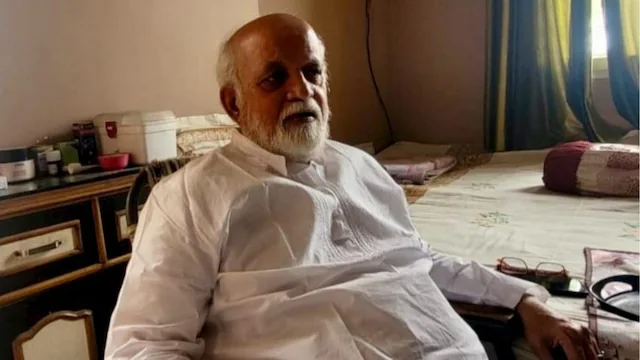‘Have Nothing Left To Celebrate’: An Urdu Scholar’s Story Of Injustice & Vindication
For professor Ali Ahmed Fatmi, vindication has come from the apex court of the country, but the retired Urdu scholar from Allahabad University says it’s too little, too late.
In the 2021 demolition drive in Uttar Pradesh’s Prayagraj, Fatmi not only lost his home of 32 years but his daughter’s house too was reduced to rubble. His wife, unable to bear the shock, passed away soon after. A lifetime’s treasure—12,000 books collected over five decades—was buried in the ruins. Though the Supreme Court finally ruled in his favour on April 1, the victory feels hollow to Fatmi. “I am thankful, but I don’t know with whom to celebrate and how to react,” Fatmi told News18.
On a quiet morning in March 2021, Fatmi received a frantic call from his daughter. The Prayagraj Development Authority (PDA) had served a demolition notice on their home in Lukerganj. The notice, dated March 1, had been handed over only a day before. The next morning, bulldozers arrived. Within hours, the house that had stood for over three decades was reduced to rubble.
While he is grateful that the Supreme Court has acknowledged the injustice done to him, the scholar’s pain remains immeasurable.
Fatmi was not the only one to suffer. His daughter Naila Fatmi’s house, along with those of lawyer Zulfiquar Haider, Baby Maimuna, and Shahnaz Parveen, were razed. The PDA claimed that the homes were illegally built on Nazul land—government-owned land leased for specific purposes. The demolitions were part of a broader campaign against land mafias, particularly targeting properties linked to notorious gangster-turned-politician Atiq Ahmad.
However, the residents, including Fatmi, denied any illegal encroachment. The suddenness of the notice and the swiftness of the action left them with no time for legal recourse. Fatmi was away in Jamshedpur attending a family wedding when he received the news. He rushed back, only to arrive hours before the demolition began. Authorities gave them barely any time to retrieve their belongings.
“We were forced to watch as our home was torn apart before our eyes,” Fatmi recounted. The Allahabad High Court refused to intervene, and by the time they reached the Supreme Court, their houses had already been turned to dust.
After the demolition, Fatmi initially sought shelter at his in-laws’ house. Eventually, he moved into a small flat in Kareli, purchased using his retirement savings from Allahabad University, where he had served as the head of the Urdu department. It was meant as a future gift for his younger daughter, but circumstances forced him to make it his home.
Despite finding a roof over his head, his life remained deeply unsettled. His vast collection of books—his lifelong companions—could not fit into the cramped space. He was forced to give most of them away, keeping only a handful. “A library is a scholar’s soul. Losing it was like losing a part of myself,” he lamented.
His wife’s passing in September 2021 compounded his grief. “She was a chronic diabetic, but after the demolition, she never recovered from the shock,” he said. In 2022, Fatmi suffered a major heart attack, leading to a surgical procedure.
After three years of relentless legal battles, the Supreme Court finally delivered its verdict on April 1, 2024. The ruling condemned the PDA’s actions as “inhuman and illegal” and ordered compensation of Rs 10 lakh to each affected homeowner.
“The manner in which the demolition has taken place shocks our conscience. Residences of the appellants have been high-handedly demolished. There is something called right to shelter, due process of law,” observed a bench of Justices Abhay S Oka and Ujjal Bhuyan.
For Fatmi, the verdict was a moral victory, though it did little to erase the deep scars of the past. “I am grateful that the court understood our pain,” he said. “But what do I have left to celebrate? My wife is gone. My home is gone. My books are gone. The void can never be filled.”
The Lukerganj demolitions were part of a larger campaign launched in Prayagraj against land mafia. In a seven-month-long drive, authorities used bulldozers to clear more than 2,000 bighas of land allegedly encroached upon by criminals, particularly those linked to Atiq Ahmad.
Atiq, a feared gangster and former MP, had amassed significant real estate in Prayagraj. In an effort to reclaim illegally occupied land, the PDA began demolishing his properties. However, in their zeal to clear entire plots, innocent homeowners like Fatmi and his neighbours were caught in the crossfire. The residents believe that since their houses were adjacent to Atiq’s properties, the authorities sought to raze the entire stretch to reclaim the land.
Atiq Ahmad’s own story came to a dramatic end in April 2023 when he and his brother Ashraf were shot dead while in police custody.
While the Supreme Court reprimanded the authorities, it does not bring back what was lost. The Rs 10 lakh compensation is meagre compared to the actual financial and emotional toll inflicted upon the residents. Yet, despite his suffering, Fatmi remains resilient. “This was never just about compensation. It was about proving that what happened to us was wrong,” he said. “Today, the court has acknowledged that.”




